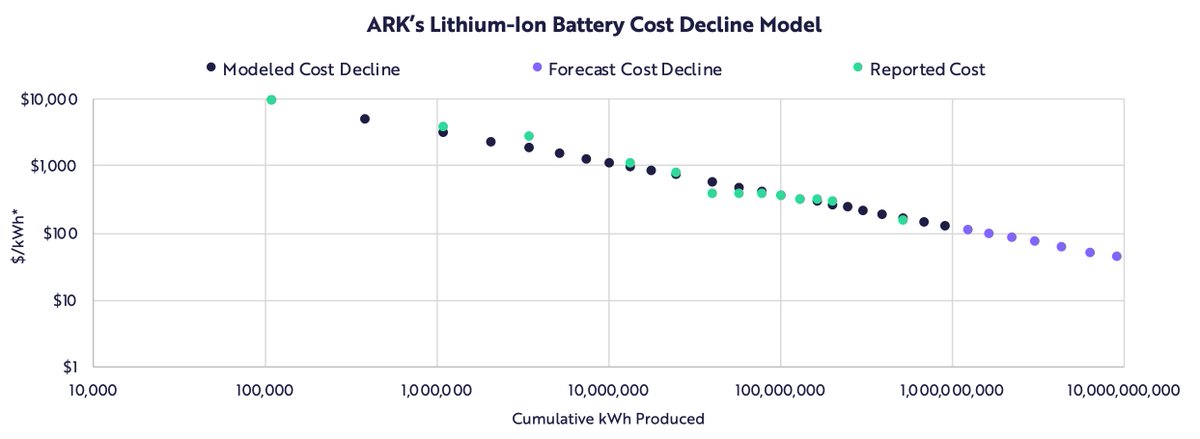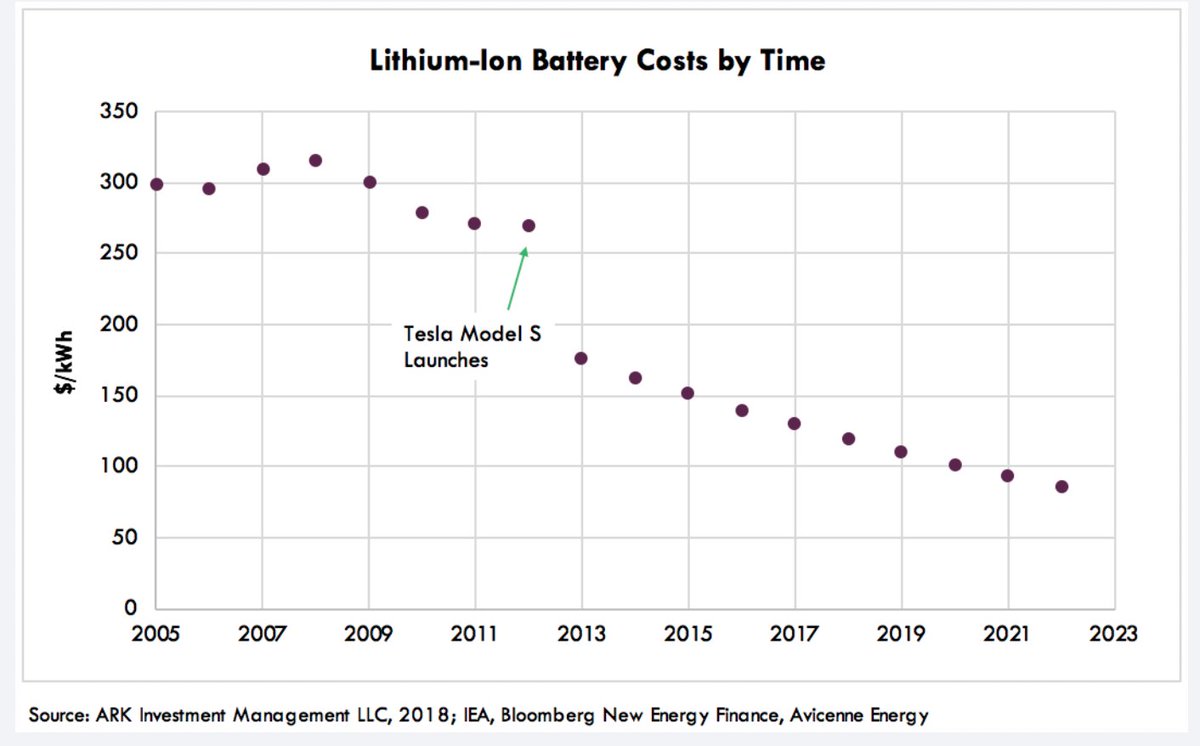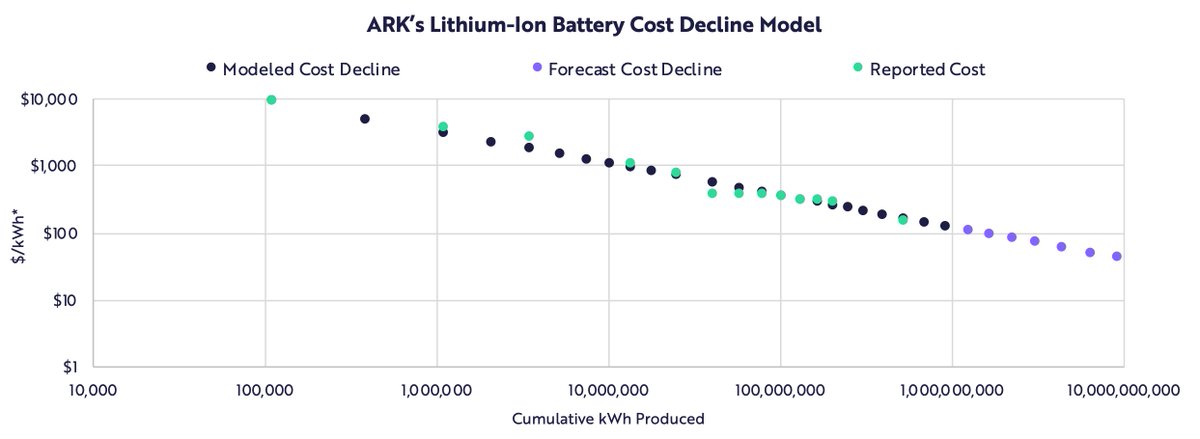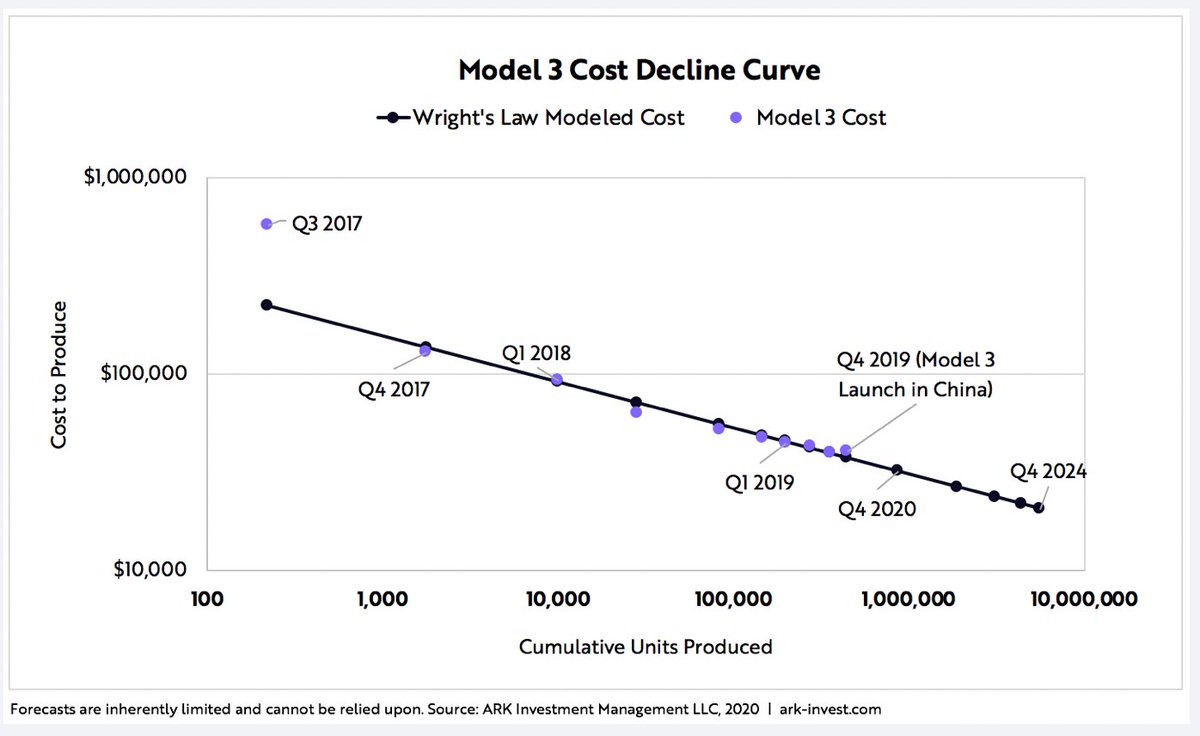1/ Tesla is creating and killing the electric vehicle competition.
Tesla’s battery day affirms Wright’s Law and spells trouble for the competition.
Tesla’s battery day affirms Wright’s Law and spells trouble for the competition.
2/ Wright& #39;s Law states that for every cumulative doubling of production costs fall by a fixed percent.
This applies beyond batteries, but we will start there.
Note the X axis is cumulative kWh not time. That is, time doesn& #39;t guarantee lower costs, increased production does.
This applies beyond batteries, but we will start there.
Note the X axis is cumulative kWh not time. That is, time doesn& #39;t guarantee lower costs, increased production does.
3/ How did Tesla create the competition?
In 2006 almost no one thought EVs would reach price parity with gas powered cars, but Tesla had a plan to drive demand and thus move along the cost decline curve as described by Wright& #39;s Law.
In 2006 almost no one thought EVs would reach price parity with gas powered cars, but Tesla had a plan to drive demand and thus move along the cost decline curve as described by Wright& #39;s Law.
4/ On an annual basis it appears like the Model S changed the cost curve, but it& #39;s actually on the same Wright& #39;s Law curve.
The Model S demonstrated demand for a form factor that uses orders of magnitude more batteries than an iPhone and so production of batteries ramped.
The Model S demonstrated demand for a form factor that uses orders of magnitude more batteries than an iPhone and so production of batteries ramped.
5/ ^That& #39;s when Tesla created the competition. People saw price parity on the horizon.
Had Tesla not made an awesome and compelling electric vehicle, battery prices may not have fallen as quickly because battery production would have been lower.
Had Tesla not made an awesome and compelling electric vehicle, battery prices may not have fallen as quickly because battery production would have been lower.
6/ On to big announcement number one: a 56% reduction in $/kWh and 3TWh of production.
It& #39;s hard to appreciate on a log/log chart, but ramping to 3TWh from today& #39;s cumulative production base is in line with Wright& #39;s Law and would lower costs by ~56%.
It& #39;s hard to appreciate on a log/log chart, but ramping to 3TWh from today& #39;s cumulative production base is in line with Wright& #39;s Law and would lower costs by ~56%.
7/ This announcement is Tesla taking its destiny and the destiny of EVs into its own hands. It& #39;s not going to let the industry drive costs down. It will do so itself and others will be brought along.
8/ Now on to big announcement number two:
A $25,000 vehicle in 3 years.
Wright& #39;s Law works for vehicle production too.
A year ago we published this https://ark-invest.com/analyst-research/wrights-law-predicts-teslas-gross-margin/">https://ark-invest.com/analyst-r...
A $25,000 vehicle in 3 years.
Wright& #39;s Law works for vehicle production too.
A year ago we published this https://ark-invest.com/analyst-research/wrights-law-predicts-teslas-gross-margin/">https://ark-invest.com/analyst-r...
9/ Tesla& #39;s vehicle and battery production ramp should drive costs low enough to make a $25,000 vehicle in three years.
10/ Why is this bad for the competition?
Generally prices from Wright& #39;s Law can be applied across an entire industry, but Tesla& #39;s speed of iteration and degree of verticalization make leaks and learnings harder to apply to other companies.
Generally prices from Wright& #39;s Law can be applied across an entire industry, but Tesla& #39;s speed of iteration and degree of verticalization make leaks and learnings harder to apply to other companies.
11/ We believe the auto industry will follow Wright& #39;s Law for battery cost declines, but delayed relative to Tesla.
12/ Once Tesla releases a vehicle with the new cell, the reverse engineering race begins. Then the product needs to be scaled. Tesla doesn& #39;t need an infinite lead, just enough time to innovate again.
13/ Our research already suggested Tesla was 3-4 years ahead on battery technology, this likely extends that by more.

 Read on Twitter
Read on Twitter







